
Victor Andrew de Bier Everleigh McLaglen was a British-American actor and boxer. His film career spanned from the early 1920s through the 1950s, initially as a leading man, though he was better known for his character acting. He was a well-known member of John Ford’s Stock Company, appearing in 12 of the director’s films, seven of which co-starred John Wayne.

The Divorce of Lady X is a 1938 British Technicolor romantic comedy film produced by London Films; it stars Merle Oberon, Laurence Olivier, Ralph Richardson and Binnie Barnes. It was directed by Tim Whelan and produced by Alexander Korda from a screenplay by Ian Dalrymple and Arthur Wimperis, adapted by Lajos Bíró from the play Counsel's Opinion by Gilbert Wakefield. The music score was by Miklós Rózsa and Lionel Salter and the cinematography by Harry Stradling.

Gertrude Maud Barnes, known professionally as Binnie Barnes, was an English actress whose career in films spanned from 1923 to 1973.
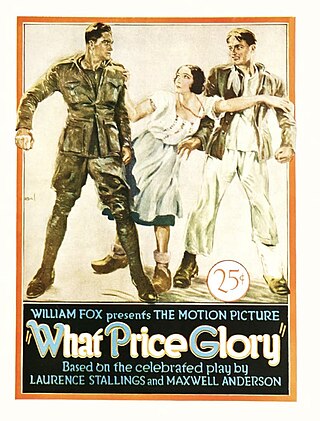
What Price Glory? is a 1926 American synchronized sound comedy drama war film produced and distributed by Fox Film Corporation and directed by Raoul Walsh. The film was released with a synchronized musical score with sound effects using the Movietone sound system. The film is based on the 1924 play What Price Glory by Maxwell Anderson and Laurence Stallings and was remade in 1952 as What Price Glory starring James Cagney. Malcolm Stuart Boylan, founder of the U.S. Coast Guard Auxiliary, was title writer on the silent Fox attraction.
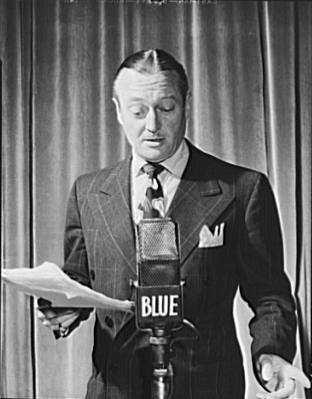
Edmund Sherbourne Lowe was an American actor. His formative experience began in vaudeville and silent film.
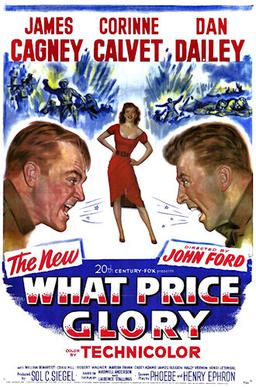
What Price Glory is a 1952 American Technicolor war film based on a 1924 play by Maxwell Anderson and Laurence Stallings, though it used virtually none of Anderson's dialogue. Originally intended as a musical, it was filmed as a straight comedy-drama, directed by John Ford and released by 20th Century Fox on August 22, 1952, in the U.S. The screenplay was written by Phoebe and Henry Ephron, and stars James Cagney and Dan Dailey as US Marines in World War I.
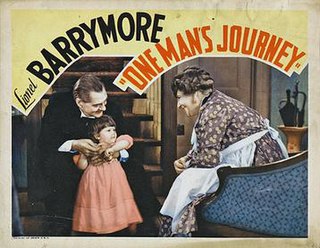
One Man's Journey is a 1933 American pre-Code drama film starring Lionel Barrymore as Dr. Eli Watt. The picture was based on the short story Failure written by Katharine Haviland-Taylor. It was remade by RKO as A Man to Remember (1938). The story tells of a small-town doctor working under difficult circumstances in a rural area somewhere in the United States.
Soldiers of the Sea is a 1939 RKO-Pathe News two-reeler short subject narrative featuring the U.S. Marine Corps.

The Captain Hates the Sea is a 1934 comedy film directed by Lewis Milestone and released by Columbia Pictures. The film, which involves a Grand Hotel-style series of intertwining stories involving the passengers on a cruise ship, was the last feature film of silent film icon John Gilbert and the first Columbia feature to include The Three Stooges in the cast as the ship's orchestra. The film also stars Victor McLaglen, Arthur Treacher, Akim Tamiroff, Leon Errol and Walter Connolly.
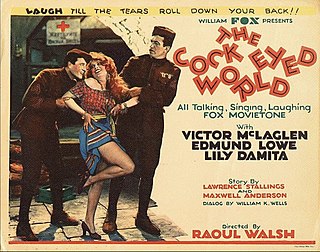
The Cock-Eyed World is a 1929 American pre-Code musical comedy feature film. One of the earliest "talkies", it was a sequel to What Price Glory? (1926), it was directed and written by Raoul Walsh and based on the Flagg and Quirt story by Maxwell Anderson, Tom Barry, Wilson Mizner, and Laurence Stallings. Fox Film Corporation released the film at the Roxy in New York on August 3, 1929.
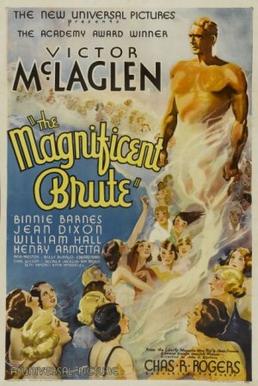
The Magnificent Brute is a 1936 American drama film directed by John G. Blystone and starring Victor McLaglen, Binnie Barnes and Jean Dixon. It was nominated for an Academy Award for Best Art Direction by Albert S. D'Agostino and Jack Otterson.
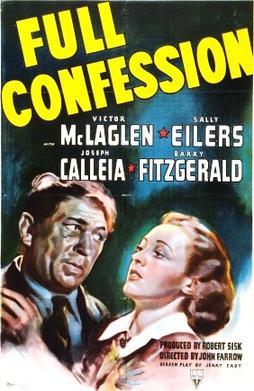
Full Confession is a 1939 United States proto film-noir, crime drama film made by RKO Radio Pictures. It was directed by John Farrow from an adaptation by Jerome Cady of Leo Birinski's story. The film stars Victor McLaglen, Sally Eilers, Barry Fitzgerald and Joseph Calleia.

Hot Pepper (1933) is an American pre-Code comedy film starring Lupe Vélez, Edmund Lowe, and Victor McLaglen, directed by John G. Blystone and released by Fox Film Corporation. The film appeared before the enforcement of the Production Code.

Sea Devils is a 1937 American action film directed by Benjamin Stoloff and starring Victor McLaglen, Ida Lupino and Preston Foster. Among the American "preparedness films" of the mid-1930s devoted to enhancing the image of the Army, the Navy and the Marines, this entry focuses equivalent approving attention on the work of the U.S. Coast Guard.
The Great Hotel Murder is a 1935 American mystery film directed by Eugene Forde and starring Edmund Lowe, Victor McLaglen, Rosemary Ames and Mary Carlisle. It is based on Recipe for Murder a 1934 story by Vincent Starrett.

Women of All Nations is a 1931 American pre-Code military comedy film directed by Raoul Walsh and starring Victor McLaglen, Edmund Lowe, Greta Nissen and El Brendel. It was the second of three sequels to Walsh's 1926 film, What Price Glory?, with McLaglen and Lowe reprising their roles.
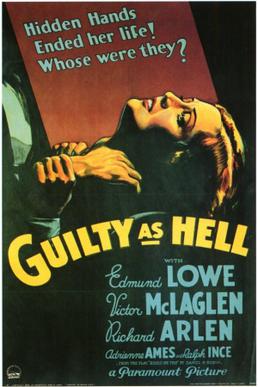
Guilty as Hell is a 1932 American pre-Code mystery film directed by Erle C. Kenton and written by Arthur Kober and Frank Partos. The film stars Edmund Lowe, Victor McLaglen, Richard Arlen, Adrienne Ames, Henry Stephenson, Ralph Ince and Noel Francis. The film was released on August 5, 1932, by Paramount Pictures.
Battle of Broadway is a 1938 American comedy film directed by George Marshall and written by Lou Breslow and John Patrick. The film stars Victor McLaglen, Brian Donlevy, Gypsy Rose Lee, Raymond Walburn, Lynn Bari and Jane Darwell. The film was released on April 22, 1938, by 20th Century Fox.
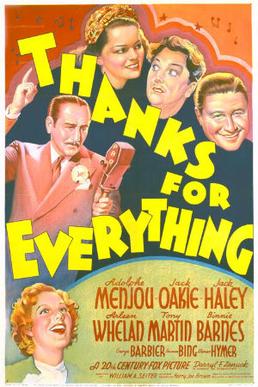
Thanks for Everything is a 1938 American comedy film directed by William A. Seiter, written by Curtis Kenyon and Harry Tugend, and starring Adolphe Menjou, Jack Oakie, Jack Haley, Arleen Whelan, Tony Martin and Binnie Barnes. It was released on December 23, 1938 by 20th Century-Fox.
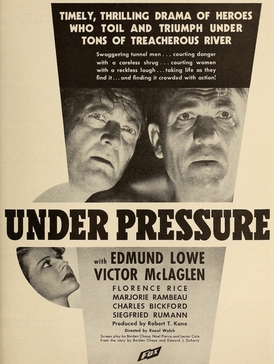
Under Pressure is a 1935 American drama film directed by Raoul Walsh, written by Borden Chase, Lester Cole and Noel Pierce, and starring Edmund Lowe, Victor McLaglen, Florence Rice, Marjorie Rambeau, Charles Bickford and Sig Ruman. It was released on February 1, 1935, by Fox Film Corporation.

















